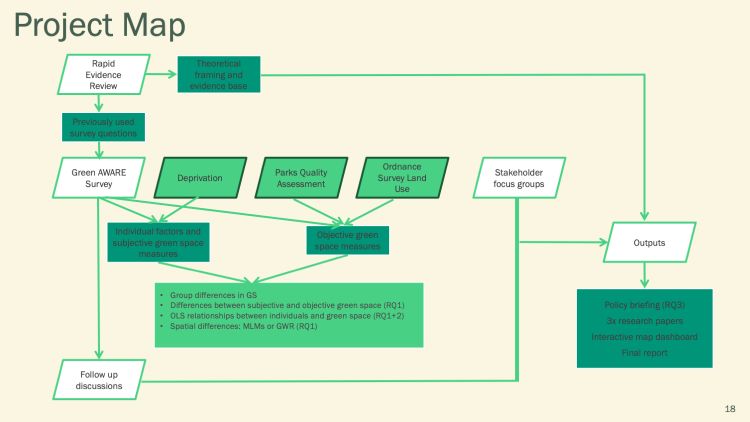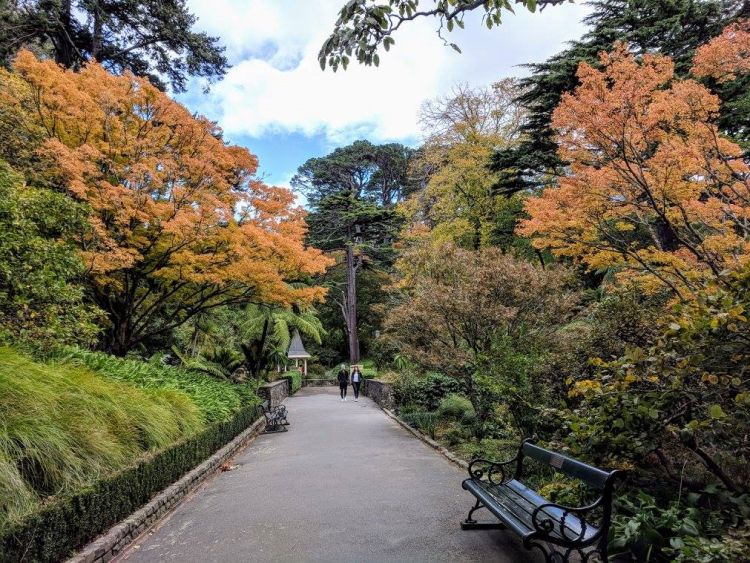Research project
GreenAWARE: Greenspace Access, Wellbeing, and Resident Equality
- Start date: 1 June 2024
- End date: 31 January 2026
- Funder: Economic and Social Research Council (ESRC)
- Value: £306,118
- Partners and collaborators: Leeds City Council, Bradford Council
- Primary investigator: Dr Vikki Houlden, School of Geography, University of Leeds
- Co-investigators: Dr Anna Barker

Introduction
The Green AWARE project is a collaboration between academics and the University of Leeds, local councils, and community stakeholders, to help us understand how to make green spaces in Leeds and Bradford as beneficial and inclusive as possible, to meet the needs of our fantastic, diverse, local communities. It explores a range of characteristics of our green spaces and residents, and applies social and spatial research methods, to both improve academic understanding and develop practical strategies to make these spaces welcoming- both physically and socially.
Meet the project team
Dr Vikki Houlden
Vikki is Principal Investigator. She is responsible for leading and managing the project, with a particular focus on survey development and socio-spatial analysis.
She has an interdisciplinary background in health geography, urban science, engineering, and data science. She aims to understand the ways in which spaces and places embody inequalities, and the social structures influencing how people relate to their environment. She is particularly interested in how urban landscapes impact health and wellbeing. Her research around healthy built environments led to consultancy on the University Mental Health Charter by Student Minds, and been cited as part of Public Health England’s Improving Access to Greenspace guidance.
Dr Anna Barker
Anna is the project’s Co-Investigator. She will support survey development, facilitate focus groups and help translate findings to maximise their impact on local and national decision-makers.
Anna is passionate about making parks and public spaces feel safe, convivial and inclusive. She leads interdisciplinary research in partnership with local and combined authorities, policing organisations, and charities to support change. She conducted the Leeds Parks Survey in 2017 which informed the Leeds Parks & Green Spaces Strategy 2022-2032 and collaborated on a study of Bradford’s City Park. Most recently, she led the Safer Parks Project, a Q-methodology study exploring women and girls' perceptions of safety, resulting in the co-creation of ‘Safer Parks: Improving Access for Women and Girls’ guidance adopted by the Green Flag Award. She co-founded the international Parks & Green Spaces Research Portal hosted by Green Flag Award, which aims to bring together global expertise and make it easy to share ideas, research and evidence to support park policymaking and good practice. She is also a Trustee of Love Leeds Parks.
Dr Jenny Gray
Jennie is the project's Research Fellow. She will lead the Rapid Evidence Review and support data analysis of both primary survey data and secondary datasets, contributing to the understanding of socio-spatial inequalities in greenspace accessibility.
Jennie is an Early Career Researcher with a background in geography, GIS, and geographic data science. She has developed a Cash Inclusion Index for England and Wales, where she analysed the provision of cashpoints for populations vulnerable to cashlessness. She was also a Data Scientist for the Consumer Data Research Centre, gaining experience in data governance.
Jennie's research interests centre on all things related to the neighbourhood - namely identifying and predicting sociodemographic processes of change like gentrification. She is interested in exploring urban dynamics, geodemographics, and the socio-spatial inequalities that emerge within neighbourhoods.
Jennie has always had a passion for nature, and loves walking her (mum's!) dog in beautiful local greenspaces. Her academic journey into greenspace accessibility began during her undergraduate and postgraduate studies, where she conducted research on barriers to greenspace use and a spatial analysis of greenspace accessibility. Jennie is excited to return to this topic, and contribute to the Green AWARE project.
Project partners
We’re pleased to be working with Leeds City Council’s Climate Energy and Green Spaces Department and Bradford City Council’s Parks and Greenspace Department on this project.
Project summary
We need to look in detail at the characteristics of both the greenspaces and those who are(n't) using them, to understand the physical and social barriers faced by different, or intersectional, groups- particularly those who don’t currently use their local greenspaces. This study will be the first of its kind to use both quantitative and qualitative methods which combine a large survey, spatial analysis, and local focus groups, to compare both objective and subjective experiences of greenspace access.
Aims and Objectives
The overall aim of this research is to develop new understanding of intersectional urban greenspace inequality and propose ways in which greenspace can be designed and managed to reduce socio-demographic access inequalities, overcome social and cultural barriers to use, and promote wellbeing, using two cities in West Yorkshire (WY) as a case study. Three research questions (RQs) will be the focus of the project:
RQ1: How does physical proximity to UGS compare to subjective experiences of access, for different locations and social groups?
RQ2: Which physical and social aspects of UGS relate to feelings of access, inclusion, and wellbeing?
RQ3: What policy measures and scales are needed to improve equitable access and enhance UGS benefits, particularly for currently excluded social groups?
Project Specifics
Using two cities in West Yorkshire as a case study and working directly with local authorities (Leeds and Bradford City Councils) and community stakeholders, this project will conduct a large survey of greenspace users and non-users in Leeds and Bradford, to identify how different people use the space, the barriers they face, and how to overcome these. This will be combined with spatial data about the local area, to identify physical characteristics of the space through network analysis.
Focus groups will help us understand exactly what residents and community organisations need from the spaces. Combining both subjective and objective perspectives will allow us to identify not only which communities of Leeds and Bradford are underserved, but also where provision is falling short of individual needs and expectations, and how changes can be made to improve both physical and social access to greenspace. You can see how all of this links together on our Project Map:

Join our accessibility forum
We’re keen to hear from members of community organisations to join our Parks and Greenspaces Accessibility Forum! The purpose of this group is to ensure our survey and focus groups are insightful, representative, and inclusive of our diverse communities within Leeds and Bradford. We’d love to speak to representatives of a whole range of organisations, such as neighbourhood groups, Park ‘Friend’s Of’ groups, walking or nature groups, etc, or those that bring together a specific demographic in our local area, such as ethnic minorities, disabled people, or the LGBT+ community, to name a few.
We have opportunities for different activities to ensure your voices and perspectives are heard: through consulting on our survey questions, distributing and advertising the survey, and speaking to us as part of focus group discussions.
If you’re interested or just want to find out more, please get in touch with Vikki Houlden at v.houlden@leeds.ac.uk!
The GreenAWARE Survey
The GreenAWARE Survey is designed to help us understand the experiences, needs, and preferences of the residents of Leeds and Bradford when they choose to use, or not use, their local green spaces. We’re really interested in hearing from people of all backgrounds, as everyone has a different point of view. The survey will be available from early 2025.
Our hopes for this project
This will contribute to academic theories of intersectional inequality and greenspace benefits, as well as feeding directly into local management plans to improve, maintain, and increase accessibility of greenspaces for their many potential users. It will especially look at how greenspaces can be made more welcoming and accessible to those groups who aren't currently using the spaces, to help them gain the many benefits of being around nature and engaging with their local area. We will also create resources for residents to see what is available for them in their local area. While this project is focussed on West Yorkshire, the lessons learned will be applicable far beyond this.
The innovative combination of methods also hold potential for future adaption to study intersectional disparities in access to other community assets. We will fully document the survey so it can be applied in other regions, while our policy briefings and extensive networks of researchers and practitioners across the UK and internationally will enable findings to be extrapolated more widely and improve greenspaces for all.
Watch this space for further updates on our findings and the impact they have!
Join us on Social
You can find out more about what we’ve been up to recently by following us on X: @GreenAWARE_
Impact
Image by studiogstock on Freepik
Publications and outputs
Watch this space for updates on our published outcomes.


